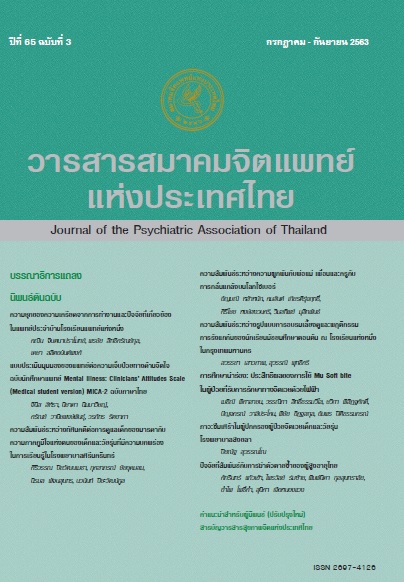Association between Maternal Attitudes and Self-esteem in Children and Adolescent with Learning Disorders at Srinagarind Hospital
Main Article Content
Abstract
Association between Maternal Attitudes and Self-esteem in Children and Adolescent with Learning Disorders at Srinagarind Hospital
Siriwan Piyawattanametha M.D., Kusalaporn Chaiudomsom M.D., Niramol Patjanasoontorn M.D., Navanant Piyavhatkul M.D.
Abstract
Objectives: To study association of maternal attitude and self-esteem in children and adolescent learning disorders and factors associated with self-esteem and maternal attitude
Methodology: This study was cross-sectional analytical study of children and adolescences age 10-18 whom were diagnosed with learning disorder by psychiatrist with DSM IV-TR criteria. Data collection was performed by using demographic questionnaires, Rosenberg Self-Esteem Scale - Thai version (RSES) and Attitude of Child Care Scale. The author analyzed the data by descriptive analysis and logistic regression analysis using SPSS for Windows version 16.0
Results: Thirty-seven pairs of mothers and children were included in the study. Mean age of the children was 11.41 years and mean of intellectual quotient was 107.25. Mean score of RSES was 28.16 (out of 40). Mean score of maternal attitude was 141.57 (out of 180). The study on correlation revealed maternal attitude was statistical significantly associated with child self-esteem (Correlation coefficient 0.569, p<0.001). Factors associated with child self-esteem were age (p=0.006), extra class (p=0.019), birth order (p=0.024), maternal marital status (p=0.044) and maternal education (p=0.004). Factors associated with maternal attitude were age (p<0.001), extra class (p=0.043), birth order (p<0.001), primary caregiver (p<0.001), maternal age (p=0.001) and maternal education (p=0.006).
Conclusion: Maternal attitude was statistical significantly associated with child self-esteem in children and adolescent with Learning disorders. Factors associated with child self-esteem were age, extra class, birth order, maternal marital status and maternal education. Factors associated with maternal attitude were age, extra class, birth order, primary caregiver, maternal age and maternal education. This study had limitation due to single site study and had not included other factors that might be associated with self-esteem and maternal attitude.
Keywords Maternal attitude, Self-esteem, Learning disorders
Article Details
Articles submitted for consideration must not have been previously published or accepted for publication in any other journal, and must not be under review by any other journal.
References
2. Moungsuwan L, Piyasil V, Pruksananonda C, Chomchai C, Aimpramsilapa S, Ningsanohl V. In : Ningsanohl, Piyasil V, Sutra S, editors. Health Status in Thai Children and Adolescent 2010. The Royal College of Pediatricians of Thailand. Bangkok : Beyound Enterprice Inc; 2010: 137-60
3. Piyasil V, Wangtan S. Learning Disorders and Comorbidity. J Psychiatr Assoc Thailand 2015; 60(4): 287-96
4. Harald V. Students With Learning Disabilities and Low-Achieving Students: Peer Acceptance, Loneliness, Self-Esteem, and Depression. Social Psychology of education 1999; 3: 173-192.
5. Amy M. G. Comparing the Self-Concept of Students With and Without Learning Disabilities. Journal of Learning Disabilities 2003 ;36(3).
6. Manika P. Predicting Factors for Risk of Depression in Adolescents with Learning Disorders. J Med Assoc Thai 2012; 95(11): 1480-4.
7. Edward M, Robert W. M. Predictor of Self-Esteem: The Roles of Parent-Child Perceptions, Achievement, and Class Placement. Journal of Learning Disabilities 1992; 25(1): 72-80.
8. Sandeep L. Comparison of Self-Esteem and Maternal Attitude Between Children with Learning Disability and Unaffected Siblings. Indian J Pediatr 2013. 80(9):745-9.
9. Thananarapong J. Psychosocial factors predicting child care behaviors in autistic children's mothers. Graduate School: Chiang Mai University; 2007.
10. Piyavhatkul N, Aroonpongpaisal S, Patjanasoontorn N, Rongbutsri S, Maneeganondh S, Pimpanit W. Validity and Reliability of the Rosenberg Self-Esteem Scale-Thai Version as Compared to the Self-Esteem Visual Analog Scale. J Med Assoc Thai 2011;94(7).
11. Wongkhan M, Nintachan P, Sangon S. Factors Related to Resilience in Adolescents. The journal of Psychiatric Nursing and Mental Health 2015; 29(1): 57-75
12. S Karande, S Kuril. Impact of parenting practices on parent-child relationships in children with specific learning disability. J Postgrad Med. 2011; 57(1):20-30.
13. Adler A. Child and Adolescent Psychology. G.R. Medinnus and R.C. Johnson. New York: John Wiley & Sons Inc; 1974.
14. Alami A, Khosravan S, Moghadam L.S, Pakravan F, Hosseni F. Adolescents’ Self-Esteem in Single and TwoParent Families. IJCBNM 2014; 2(2).
15. Usakli H. Comparison of Single and Two Parents Children in terms of Behavioral Tendencies. International Journal of Humanities and Social Science 2013;3(8).
16. Chandramuki, Shastry, I.V.K., Narasimha M, Vranda. Attitudes of Parents towards Children with Specific Learning Disabilities. Asia Pacific Disability Rehabilitation Journal 2012; 23: 63-9.
17. Ragozin, Arlene S. Effects of Maternal Age on Parenting Role. Developmental Psychology 1982,18(4): 627-34.


